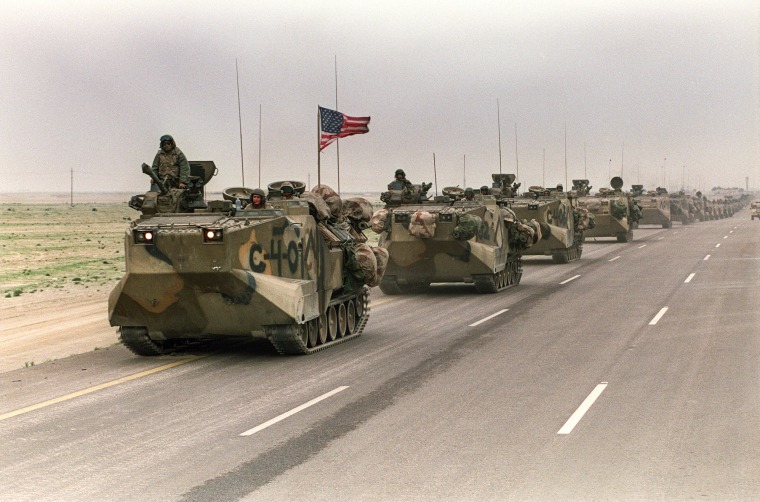WASHINGTON — The Senate voted Thursday to open debate on a bipartisan bill that would repeal the authorizations Congress passed in 1991 and 2002 for the U.S. wars in Iraq.
Lawmakers voted 68-27 to proceed with the legislation, a move that required 60 votes and the first of several votes related to the measure.
The bill would repeal the authorizations for the use of military force for the Gulf War in 1991 under President George H.W. Bush and for the invasion of Iraq in 2003 under President George W. Bush.

In remarks on the floor, Senate Majority Leader Chuck Schumer, D-N.Y., said Thursday that the bill puts “the final remnants of those conflicts squarely behind us.”
"The United States, the nation of Iraq, and the entire world have changed dramatically since 2002, and it’s time the laws on the books catch up with these changes," he said. "The Iraq War has itself long been over. This AUMF has outlived its purpose and we can no longer justify keeping it in effect."
The White House said in a formal notice Thursday that President Joe Biden would sign the legislation if it comes to his desk. The House would have to vote on it first before that could happen, however, if it passes the Senate.
Sens. Tim Kaine, D-Va., and Todd Young, R-Ind., are the measure's lead sponsors. In total, 41 senators have co-sponsored the bill, including 12 Republicans. Kaine said Iraq's government supports the legislation, telling reporters, "They do view it as an acknowledgment of the new chapter in their relationship and it would be seen as a positive."
Notably, the bill would not repeal or affect the war authorization that Congress passed in 2001, in the wake of the 9/11 terror attacks, which started the so-called war on terror. U.S. presidents have since relied on that measure to authorize various military operations toward nonstate terrorist organizations that have posed threats to Americans.
Congress has previously been unable to pass repeals of these war authorizations, largely because of intense division over that 2001 measure. Over the last decade, a number of lawmakers have called for the reversal of that authorization because, they've argued, it's overly broad and has been taken advantage of. But the debate over the measure has been intractable because some members of Congress have wanted to modify the language or keep it entirely.
At a news conference after the Senate vote, Kaine was asked what was different this time around after having worked on repeals of the war authorizations for years.
“I think as you get to the 20th anniversary, more and more people realize there’s potential abuse of zombie authorizations sitting on the books,” he said.
Young told reporters, "I believe this will establish a very important precedent moving forward, so that the people I represent, and Senator Kaine and so many others represent, know that their voice will matter when it comes to important decisions of war and peace."
The Senate is expected to continue considering the repeal of the Iraq War authorizations next week and will hold votes on amendments. Kaine has said those amendments are likely to be centered around Iran and Article II, which deals with executive power.
The U.S. withdrew troops from Iraq in 2011, when Biden served as vice president. Biden withdrew U.S. forces from Afghanistan in 2021 in a widely criticized, chaotic operation, ending America's longest war.

